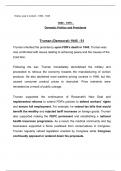History year 2 content - 1890 - 1945
1945 - 1975 -
Domestic Politics and Presidents
Truman (Democrat) 1945 - 51
Truman inherited the presidency upon FDR's death in 1945. Truman was
now confronted with issues relating to achieving peace and the causes of the
Cold War.
Following the war, Truman immediately demobilised the military and
proceeded to refocus the economy towards the manufacturing of civilian
products. He also abolished most wartime pricing controls in 1946, but this
caused consumer product prices to skyrocket. Price restraints were
reinstated as a result of public outrage.
Truman supported the continuance of Roosevelt's New Deal and
implemented reforms to extend FDR's policies to defend workers' rights
and ensure full employment. For example, he vetoed tax bills that would
benefit the wealthy and rejected tariff increases on foreign goods. Truman
also supported making the FEPC permanent and establishing a national
health insurance programme. As a result, the medical community and big
businesses supported a fierce pushback from conservatives in Congress.
Truman regularly vetoed legislation enacted by Congress while Congress
continually opposed or watered down his proposals.
, Truman re-election
Truman appeared to have little chance of winning the 1948 presidential
election. The Republican candidate, Dewey, appeared to be winning
according to polls.
The victory of the Republicans in the 1946 congressional elections
suggested that the people had grown tired of the Democratic party's reforms.
Truman also struggled to win over his own party's members. Many Liberal
Democrats opposed his tough stance against the Soviet Union and
instead backed Harry Wallace of the Progressive Party.
Truman won a second term with 49% of the popular vote after campaigning
against Republican conservative policies and further embracing the civil
rights movement by desegregating the military and prohibiting
discrimination in the civil service.
Trumans 2nd Term - The Fair Deal vs Congress
Truman’s second term was no less eventful than his first as he continued to
face issues both at home and abroad.
After his re-election, Truman promised Americans his ‘Fair Deal’ which
included:
Reforms of the tax system,
Expansion of social security eg Nation health insurance and civil rights,
Federal aid for small farmers,
Increased funding for education.
Repeal of the Taft-Harley Act.
, However, Congress' opposition meant that the Fair Deal was only partially
put into effect. The repeal of the Taft-Harley Act, national health insurance,
education funding, and civil rights legislation were all completely blocked.
Only Congress approved an increase in the minimum wage and a public
housing and slum clearance bill called the Housing Act in 1949, followed
by an expansion of Social Security in 1950. Cold War tensions, including
the Communist Revolution in China (1949), Russia's successful test of an
atomic weapon (1949), and the start of the Korean War (1950), significantly
hampered Truman's domestic policies demonstrating the presidential
powers' limitations.
Eisenhower (Republican) - 1953 - 61
Domestic policy
During the campaign of 1952, Eisenhower criticised the big government programs of
Truman's Fair Deal, yet he did not share the extreme views of some Republican
conservatives like eliminating Fair Deal and rolling back government regulation of the
economy. Instead, he chose a middle ground between liberalism and conservatism
that favoured modern Republicanism. Although government support would be given
to those in need, the aim was to preserve freedom and the free market.
As President, Eisenhower thought that government should provide some additional
benefits to the American people. This was demonstrated by his continuation of the Fair
Deal, which enhanced Social Security, raised the minimum wage, and established
the Department of Health, Education, and Welfare.
In domestic politics, He advocated the 1956 Interstate Highways Act, which built a
41,000-mile road system and significantly boosted the automotive industry and




